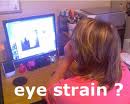The most common reason why patients see an eye doctor because of their experiencing of some degree of eye “pain” or eye “strain” which in layman’s terms, eye pain simply refers to “any discomfort in the area of the eye. The following are some its possible causes:
a) Eye strain, which can occur when the eyes are overused, lack of sleep, stress, astigmatism(improper focus) or poor illumination while reading.
Studies also has shown that most office workers who are exposed to prolonged use of computers, have complained of eye strain. Normal use of our eyes are design to shift focus between objects that are close and that are far away, prolonged focusing on a single object can caused eyestrain.
This usually affect people whose work involves holding an object close to the eyes, those who read a lot or spend extended hours watching TV.
Symptoms of eyestrain includes headaches, blurred vision, pain or soreness of the eyeball, red and watery eyes, dry eyes that feel scratchy, tired aching heaviness of the eyelids or forehead, backaches, neck aches and muscle spasm.
In order to help relieve eyestrain, the following can be done: a) Do frequent blinking to lubricate the eyes and prevent drying. b) Close your eyes and let it relax for a minute c) Change your focus by glancing across the room, or out the window every 15 or 30 minutes to look at an object at least 20 ft.(6 m.) away
Here are some more tips to help prevent eyestrain: a) Make sure that any close up work of your computer screen is 18 – 28 inches away from your eyes. b) Position the top of your computer or TV screen at or slightly below eye level.
c) If more than one close up focus area is needed, such as using reference material and a computer screen, simultaneously place the two items as close to each other as possible to minimize large head, eye movements and focusing changes.
d) Keep close up objects such as a computer screen clean and dust free to minimize glare. e) Arrange lighting to minimize glare and reflections. f) Place a glare over your computer or TV screen if lighting cannot be modified.
g) If you work outdoors, use sunglasses that provide 100% protection from ultra violet rays and to prevent prolonged squinting that may also strain the eyes and facial muscles. h) If you are working with computer or TV monitor or other similar piece of equipment, keep it in proper focus. i) Take frequent vision breaks.
The above tips can spell the difference to your eyes, so easy and simple to follow reminders, which your eyes will love you for it.
